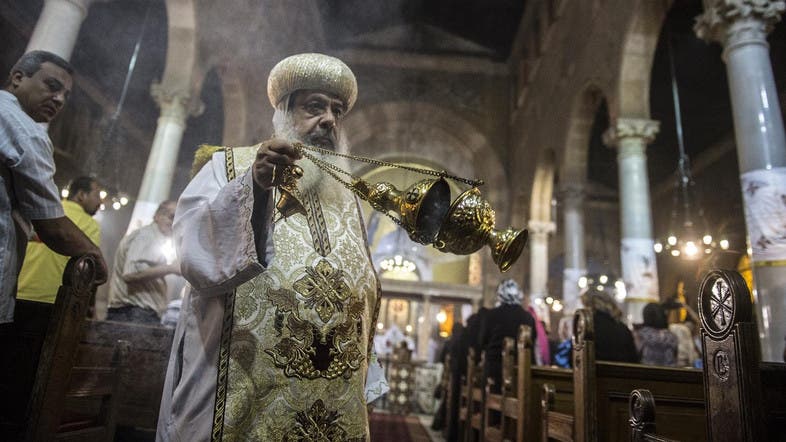EgyptŌĆÖs law on the construction of churches sparks ire

The construction of churches has for years been a major reason for clashes between Muslims and Christians in Egypt, especially in the south. A rumor that a new church will be constructed in some village with a considerable Christian population is enough to ignite a conflict that in most cases turns bloody. The complicated procedure of obtaining a permit to build a church also drives some Christians to turn their own houses into prayer areas, another cause of sectarian clashes. Added to that is the fact that restrictions imposed on the construction of churches date back to the Ottoman rule of Egypt and that modifications of the law have not proven to make things any easier for Egyptian Christians. The recent eruption of sectarian violence in Upper Egypt underlined the necessity of expediting the issuance of the new law on the construction and restoration of churches. Yet as promising as the steps taken toward that end might seem, disagreements over the law forebode further complications, more stalling, and possibly arriving at a dead end.
Coptic activist and director of the Egyptian Organization for Human Rights Naguib Gobreil objected to a number of articles in the new law, the foremost of which is linking the construction of new churches to the number of Christian residents in the area where the church is to be constructed. ŌĆ£There are no accurate statistics of the number of Christians in Egypt in general, so this article will deprive many Christians of having a house of worship in their village or town,ŌĆØ he said in an interview. Gobreil argued that the law did not define the shape and structure of a church in details. ŌĆ£There is no mention of the fact that a church has to have a cross on top or that domes are part of the building,ŌĆØ he explained. ŌĆ£This means that upon the construction of a new church, there might be objections to building a dome or placing crosses on top.ŌĆØ Gobreil also had reservations regarding the procedure of obtaining a construction permit which involves security approval. ŌĆ£Seeking a security approval has particularly been one of the main reasons for obstructing the construction of churches,ŌĆØ he said, in reference to security concerns over the eruption of violent clashes when a new church is built.
Bishop Yohanna Qalta, vice patriarch of the Egyptian Catholic Church, called the law ŌĆ£absurdŌĆØ since it only concerns churches. ŌĆ£There isnŌĆÖt a country in the world where a law is about a specific house of worship. The construction of houses of worship is treated everywhere like other buildings, whether schools or hospitals or any kind of organization,ŌĆØ he said in an interview. Qalta also argued that the law gives the impression that those churches are built for a foreign community not for Egyptians. ŌĆ£The very existence of such a law implies that Christians are an intruding group that needs special laws. This is a discriminatory law that takes us back to the Middle Ages. We should have laws that apply to all Egyptians regardless of their religion.ŌĆØ Qalta rejected earlier proposals at issuing a unified law for all houses of worship that would include both mosques and churches. Like Gobreil, Qalta refused linking the construction of churches with the number of Christians, but for a different reason. ŌĆ£What if there is a village that has only two Christian families? DonŌĆÖt they want to pray too? Even if one family!ŌĆØ
A disillusioned statement?
The Coptic Orthodox Church issued a disillusioned statement following a meeting of its clergy and their counterparts from the Catholic and Evangelical churches held with state officials. ŌĆ£We were shocked to see that the government made unacceptable modifications and impractical additions,ŌĆØ said the statement which also called the law ŌĆ£a threat to national unity in Egypt.ŌĆØ
The law, the statement added, undermines the principles of citizenship and is not considerate to Egyptian Christians. For Coptic MP Emad Gad, the statement is extremely alarming because it demonstrates a lack of trust between the church and the state: ŌĆ£It also makes us ask the question of whether the state is really keen on solving the problem of the construction of churches,ŌĆØ he said, adding that the governmentŌĆÖs elusive stance can trigger an ŌĆ£explosionŌĆØ in Egyptian society and requesting that the president interferes to resolve the issue.
Journalist and former head of the Press Syndicate Makram Mohamed Ahmed criticized the lack of transparency about the law and the subsequent lack of knowledge about the points of agreement and contention between the government and the three Egyptian churches. ŌĆ£For example, we have not been told about the modifications that the government made to the law and which were not accepted by the churches,ŌĆØ he wrote. ŌĆ£We only knew that such a thing happened when the Coptic Orthodox Church issued a statement.ŌĆØ Ahmed added that objections by the churches and a number of Coptic figures are always linked to a deeper problem that involves state policies towards Christians in Egypt. ŌĆ£For example, how come that till the present moment we donŌĆÖt have the accurate number of Christians in Egypt?ŌĆØ Ahmed also objected to the part of the law in which disputes about the construction of a church are handled by the Administrative Court. ŌĆ£If the governor refuses to approve the construction of a church, why shouldnŌĆÖt the case be handled by the Court of Urgent Matters and is instead assigned to the Administrative Court which can take up to 10 years?ŌĆØ
In response to objections, Prime Minister Sherif Ismail stressed that the law will only be finalized after a full agreement is reached with the three churches and that the government is keen on meeting the churchŌĆÖs demands: ŌĆ£We are currently engaged in continuous negotiations and will make sure the law comes out soon in its final form,ŌĆØ he told the Middle East Agency. The PM, however, did not comment on the criticism leveled against the law. Minister of Social Solidarity Ghada Wali dismissed rumors that churches built in the future will have no crosses on top, the issue on which much of the controversy focused. ŌĆ£These rumors are groundless and do not make any sense,ŌĆØ she said. ŌĆ£Churches will have an altar, a pulpit, a baptism room, a spire, a sanctuary, domes, and crosses.ŌĆØ Wali, however, did not address the articles of the law.
In the midst of the heated debate, the government issued a brief statement stressing that the issue was resolved after ŌĆ£reaching an agreement with the three churches,ŌĆØ but gave no details. The governmentŌĆÖs announcement came a day after the three Egyptian churches issued quite an enigmaticstatement: ŌĆ£We pray that the application of the law will be a step forward towards building the new Egypt. We understand that the first years will prove how feasible the law is and we hope no problems will surface on the ground.ŌĆØ



